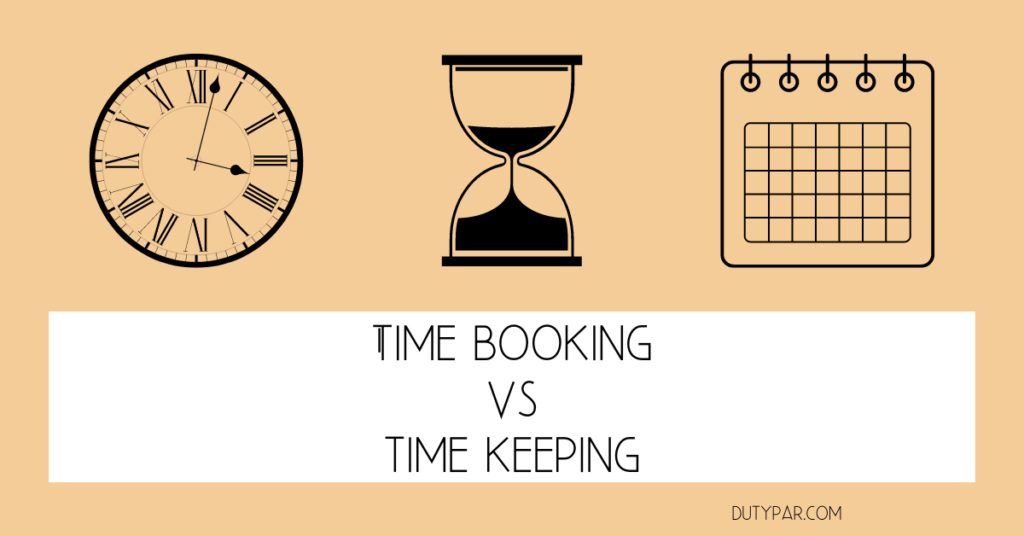Table of contents
- Introduction:
- What is Time Keeping?
- What is Time Booking?
- Key Differences Between Time Keeping and Time Booking
- Benefits of Time Keeping
- Benefits of Time Booking
- Why Understanding the Difference Matters?
- How to Implement Time Keeping
- How to Implement Time Booking
- When to Use Time Keeping vs. Time Booking
- Conclusion

Introduction:
In business, effective time management plays a key role in maintaining productivity and controlling finances. Two concepts that frequently emerge in this area are time keeping and time booking. Although these terms may seem alike, they have distinct functions and serve different roles in managing time, tasks, and resources. In this article, we will delve into the difference between time keeping and time booking, highlight their significance, and explore how companies use these systems to enhance overall efficiency.
What is Time Keeping?
Time keeping refers to tracking the amount of time an employee or worker spends on various tasks, jobs, or activities. It is a basic method used to record attendance, working hours, and even breaks. Time keeping ensures that employees are paid accurately for the time they work, and it helps employers manage labor costs effectively.
For example, if an employee works an eight-hour shift, time keeping records the start and end times of that shift. The primary goal of time keeping is to ensure that all employees’ work hours are properly tracked and documented.
What is Time Booking?
On the other hand, time booking involves assigning specific time to various projects, tasks, or activities. Instead of simply recording the total number of hours worked, time booking allocates time spent on different tasks or projects within those working hours. This system is used to understand how much time is dedicated to specific jobs and to ensure the correct billing of clients when necessary.
For instance, a marketing agency may use time booking to record how much time employees spend working on different clients’ projects. This helps in accurate client billing, better project management, and analyzing productivity levels.
Key Differences Between Time Keeping and Time Booking
Understanding the difference between time keeping and time booking can help you determine which system is best for your needs. Here’s a breakdown of the main distinctions:
- Purpose:
- Time Keeping: Focuses on tracking employee attendance and total working hours.
- Time Booking: Focuses on tracking how much time is spent on specific tasks or projects within those hours.
- Application:
- Time Keeping: Used primarily for payroll and attendance records.
- Time Booking: Used for project management, client billing, and task tracking.
- Detail Level:
- Time Keeping: Provides a general overview of how long someone worked.
- Time Booking: Provides detailed insights into how much time was allocated to specific activities.
- Usage:
- Time Keeping: Common in hourly-based jobs like retail, manufacturing, and hospitality.
- Time Booking: More common in industries like consulting, law, and marketing where accurate project billing is essential.
- Outcome:
- Time Keeping: Ensures employees are paid correctly based on the number of hours worked.
- Time Booking: Helps businesses understand how efficiently time is being spent on different tasks or projects.
Benefits of Time Keeping
Time keeping offers a variety of benefits for businesses, especially in industries that rely on hourly work. Here are some of the key advantages:
- Accurate Payroll: Time keeping ensures that employees are paid fairly for the exact hours they work. This prevents underpayment or overpayment.
- Attendance Management: With time keeping, businesses can easily monitor employee attendance, track overtime, and ensure compliance with labor laws.
- Labor Cost Control: By keeping accurate records of employee working hours, companies can better manage their labor costs and adjust staffing levels as needed.
- Compliance: Time keeping helps businesses comply with labor laws, such as overtime regulations, minimum wage requirements, and mandated breaks.
Benefits of Time Booking
While time keeping is essential, time booking brings additional benefits, particularly for service-based businesses or companies that handle multiple projects. These benefits include:
- Project Tracking: Time booking helps businesses keep track of how much time is spent on different projects, allowing them to analyze efficiency and productivity.
- Client Billing: Time booking ensures accurate billing for clients based on the time spent on their projects. This transparency builds trust and improves client satisfaction.
- Improved Productivity: By breaking down the working day into different tasks, businesses can identify areas where time is being wasted and make improvements.
- Resource Allocation: Time booking provides insights into how much time is being spent on each project, helping managers allocate resources more effectively.
Why Understanding the Difference Matters?
Recognizing the difference between time keeping and time booking is vital for businesses that want to improve efficiency, track employee productivity, and manage labor costs effectively. Each system offers unique benefits, and some businesses may need to use both to gain the most value.
A construction company, for instance, might rely on time keeping to ensure workers are compensated accurately for their on-site hours. At the same time, they could implement time booking to monitor how much time is allocated to specific tasks like building, painting, or plumbing. This combined strategy allows the business to control labor costs effectively while ensuring projects stay on schedule and within budget.
How to Implement Time Keeping
Implementing an effective time keeping system doesn’t have to be complicated. Here are some steps to get started:
- Choose the Right Tool: There are many time keeping tools available, from traditional punch clocks to modern software solutions. Choose a tool that meets your business needs and budget.
- Train Employees: Ensure that employees understand how to use the time keeping system correctly. This will reduce errors and ensure accurate records.
- Monitor and Review: Regularly review the time keeping data to identify patterns, such as frequent tardiness or overtime, and make adjustments as needed.
- Integrate with Payroll: Make sure your time keeping system is integrated with your payroll system to ensure that employees are paid correctly and on time.
You may visit on this site for reference : History of timekeeping devices
How to Implement Time Booking
If your business handles multiple projects, time booking can be a valuable tool. Here’s how to implement it effectively:
- Select a Time Booking Software: There are various time booking software options available, such as Toggl, Harvest, or Clockify. Choose one that fits your industry and team size.
- Set Up Projects and Tasks: Define the projects and tasks that need to be tracked. This will allow you to allocate time appropriately and generate accurate reports.
- Encourage Consistent Use: Ensure that employees are consistently logging their time into the time booking system. Regular use is crucial for generating meaningful data.
- Analyze and Optimize: Use the data from your time booking system to analyze productivity and make improvements. This could involve reallocating resources, streamlining processes, or setting more realistic timelines.
When to Use Time Keeping vs. Time Booking
Now that you understand the difference between time keeping and time booking, you might wonder when to use each system. Here are some guidelines:
- Use Time Keeping if your primary goal is to track attendance and ensure accurate payroll.
- Use Time Booking if you need to track time spent on specific tasks, projects, or clients.
Some businesses may find value in using both systems. For example, a law firm might use time keeping to ensure that lawyers are working the correct number of hours, while also using time booking to accurately bill clients for the time spent on individual cases.
Conclusion
To sum up, the difference between time keeping and time booking revolves around their goals, use cases, and the depth of information they provide. Time keeping primarily tracks total working hours for payroll and attendance, while time booking offers a more detailed look at how time is allocated to specific tasks or projects. Both approaches are essential for boosting business efficiency, controlling labor costs, and increasing productivity. Whether your organization needs to monitor employee attendance or manage various projects, understanding these systems can lead to improved time management and financial success.
Related BLOGS





